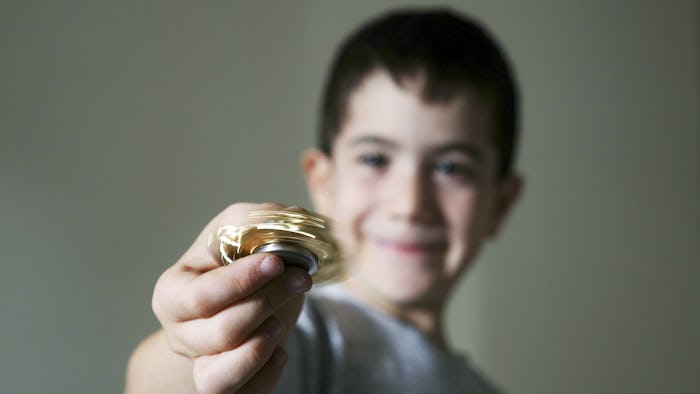Life
Can Fidget Spinners Help With Autism?
I have severe Attention Deficit Hyperactivity Disorder (ADHD). My son does as well. He is also diagnosed with a spectrum disorder known as sensory processing disorder. I know that I need motion and distraction to think, and he does, too. But are fidget spinners a solution? Can fidget spinners help with autism?
My son and I are both referred to as "chronic stimmers." Stimming is a repeated movement performed by an individual thought to relieve stress or provide psychological focus for that individual, according to the Journal of Integrative Psychological and Behavioral Science. My son has a tendency to do things like squeeze his thumb inside of his fist, or bounce. He loves to jump. Me? I like to rock — I'm actually rocking right now. The chair at my desk is a rocking chair piled high with pillows so it's tall enough for me to sit comfortably at my desk. I rock for many reasons — it helps my concentration, it releases pent up energy, and it really, really soothes me.
Stimming is not always convenient, and it's not always enough. I can't always calm myself by simply rocking, just as my son cannot always find his focus by jumping in place. The Child Development Institute remarked on how a point of focus, like a toy or other object, can help center someone with autism, and that sensory toys are often integrated into intervention therapies for autistic children. If this is the case, can fidget spinners help with autism?
Recently, The Chicago Tribune published a scathing editorial on fidget spinners, the latest toy craze. The author, Rex Huppke, argued that fidget spinners are merely an imported fad device from China — an annoyance and passing fancy which should be avoided at all costs. He likened fidget spinners to adults who must have the newest iPhone models in its likely inability to hold attention for very long.
That very well may be true — for neurotypical kids. I, however, was never a neurotypical child, and neither is my son. Yes, fidget spinners are new. Very new, in fact. I'd never actually seen one of these until some time during Lent. (It's very easy to remember what happens during Lent, as you are counting down the days until it ends and you can have Starbucks and cocktails again.) My son hadn't discovered them at school and it wasn't the talk of his team of therapists. Actually, my husband brought it home one day saying, "My friend's kid says it helps them calm down. I got the kids some." I looked at it, tried to figure it out, and failed. Once he showed me how to use it, and how it felt in your hand as it spun, I knew my son would dig it.
We were both immediately big fans. While there's no hard data on whether or not these spinners are going to help with autism and ADHD, and there are actually articles attempting to argue the opposite, the toys are simply too new for any real study to be done on the subject. However, sensory play and sensory devices have been around for many years now, according to AutismSpeaks. Sensory devices and fidget toys are a vehicle for safe sensory input that may calm or help focus an autistic child by occupying nervous hands and allowing coordinated, predictable movement, according to the Asperger's Society.
I agree that these fidget spinner devices may be a distraction in the classroom, and indeed, may have no place there. However, at home, in the right circumstances, I have seen and experienced the benefit of these fidget spinners. Yes, I know this is anecdotal evidence and each person will benefit differently or not at all. However, both my son and I noticed that while we use it, we're able to focus just on that one movement without the typical distracting patterns that arise when we're doing any activity. After a period of using the device, both of us feel as though our tactile responsiveness — how we respond to input from outside forces — feels less maladapted to change than it typically does. This is not very different from other focus methods, like bouncing on a ball or throwing a tennis ball at the wall, but this one is silent, and can be done in a small area. Can fidget spinners help with autism? Maybe. Maybe not. We simply don't have the necessary data. Anecdotally? I think they're great.
This article was originally published on
